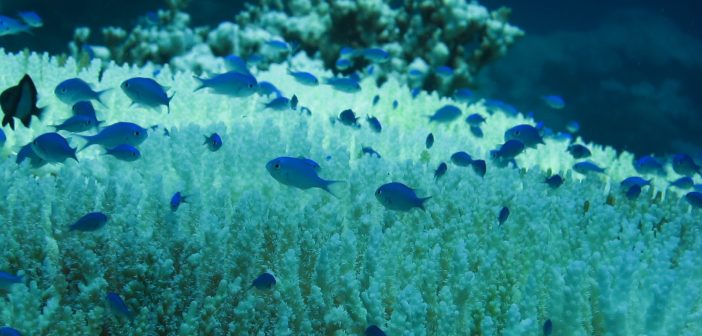(Featured image: bleached coral reef off Tioman Island, Malaysia. Credit Paul, used under CC BY-SA 2.0)
New UNC-Chapel Hill research shows that coral reef decline illustrates the far reach of climate change — and that local solutions alone cannot restore coral populations
Chapel Hill, N.C. – July 19, 2016 – For the world’s coral reefs, the picture keeps getting gloomier. Although it’s widely assumed that both local and global factors are contributing to their decline, new research from the University of North Carolina at Chapel Hill shows that isolated reefs far from human activities are in fact not healthier than those in more densely populated areas.
The work, led by John Bruno, a professor of marine biology in UNC’s College of Arts and Sciences, marks the first global test of the hypothesis that isolated reefs are suffering from less damage.
“We often mythologize isolated coral reefs as pristine and safe from harm,” said Bruno. “In fact, coral loss on some of our isolated reefs is just as dramatic as coral decline on reefs adjacent to more densely populated islands.”
Bruno and co-author Abel Valdivia (a former UNC-Chapel Hill graduate student, currently a research scientist for the Center for Biological Diversity in Oakland, Calif.), analyzed data from 1,708 reefs around the world from the Bahamas to Australia collected from 1996 to 2006. Reef isolation was calculated as the number of people living within 50 kilometers of the reefs.
The research, to be reported online July 20 in the Nature journal Scientific Reports, shows that local management efforts to mitigate impacts of things like fishing and tourism cannot alone restore coral reef populations, which provide a home for thousands of marine species and offer coastal buffering from storms.
“Widespread arguments that coral reef degradation is mostly caused by local factors are unsupported,” added Valdivia. “We found the problem is better explained by global impacts such as climate change.”
One striking example is the massive bleaching of hundreds of kilometers on the northern and central Great Barrier Reef in Australia — which is one of the world’s most isolated and well-protected reefs — that was reported earlier this year, Bruno said.
“Our work illustrates the truly far-reaching effects of global warming and the immediate need for drastic and sustained cuts in carbon emissions to help restore the health of coral reefs,” Bruno said.
__
About the University of North Carolina at Chapel Hill
The University of North Carolina at Chapel Hill, the nation’s first public university, is a global higher education leader known for innovative teaching, research and public service. A member of the prestigious Association of American Universities, Carolina regularly ranks as the best value for academic quality in U.S. public higher education. Now in its third century, the University offers 77 bachelor’s, 113 master’s, 68 doctorate and seven professional degree programs through 14 schools and the College of Arts and Sciences. Every day, faculty – including two Nobel laureates – staff and students shape their teaching, research and public service to meet North Carolina’s most pressing needs in every region and all 100 counties. Carolina’s more than 308,000 alumni live in all 50 states and 150 countries. More than 167,000 live in North Carolina.





